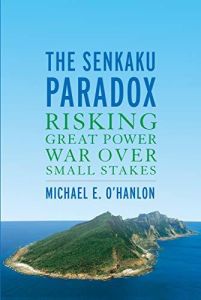Join getAbstract to access the summary!

Join getAbstract to access the summary!
Michael E. O'Hanlon
The Senkaku Paradox
Risking Great Power War Over Small Stakes
Brookings Institution Press, 2019
What's inside?
Could a minor political incident lead to World War III?
Recommendation
Could small acts of aggression undermine the post-WWII world order? In this well-researched and detailed work, foreign policy expert Michael O’Hanlon explores how seemingly minor political incidents – such as the Chinese deciding to occupy a handful of uninhabited islands in the East China Sea – could escalate into significant global conflicts. O’Hanlon makes the case that the United States and its allies must prepare an “asymmetric defense” strategy – comprising both economic and military tactics – in order to properly evaluate and respond to these sorts of risks.
Summary
About the Author
Michael E. O’Hanlon’s previous books on global security and US defense include The Future of Land Warfare and Beyond NATO: A New Security Architecture for Eastern Europe. He works at the Brookings Institution, where he is a senior fellow in foreign policy.


















Comment on this summary